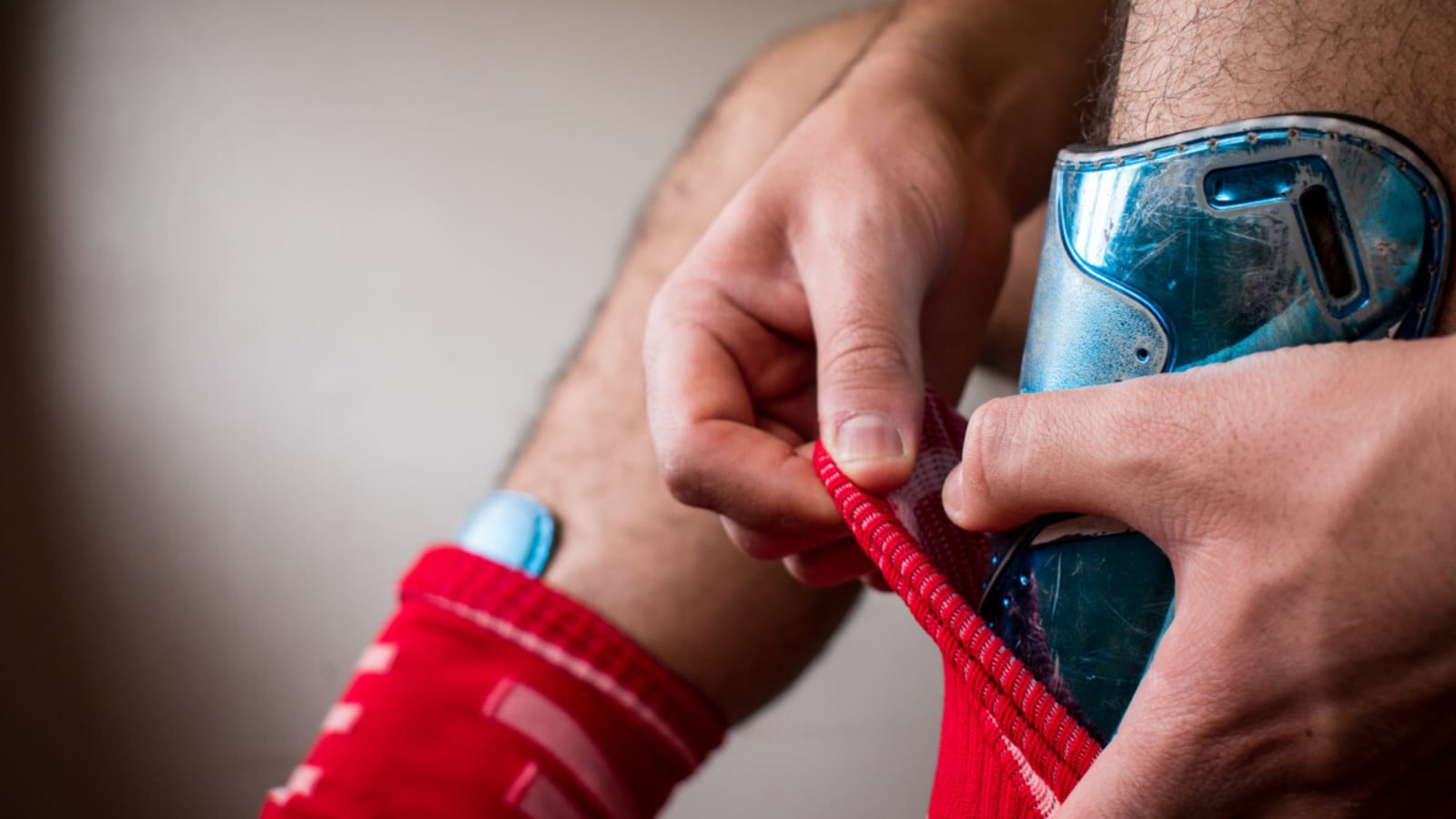
After a few matches, it’s easy to see (and smell) how dirty soccer shin guards can get—and it only gets worse on those days you're stuck playing in the rain. From lingering odors to stains, cleaning shin guards will keep them in good shape and, frankly, tolerable to wear.
Okay, so this isn't a scientific study calculating the bacteria growth, but if your soccer shin guards could talk, they’d probably have a lot to say about your recent slide tackles. Whether it’s during an intense game or a practice session, they take a beating, and frankly, it's mostly your fault. Not only do they come into contact with dirt and grass, but sweat is the biggest culprit. Trapped inside your socks and pads, the moisture has nowhere to go, creating the perfect environment for bacteria to thrive.
How Often Should You Clean Shin Guards?
The short answer: more often than you probably think. After every game or training session, it’s a good idea to at least air them out. Removing sweat and loose dirt buildup can prevent unpleasant smells that only get worse over time.
But for a proper cleaning? Aim for a complete wash every few weeks, depending on how often you play. If you’re in a league with back-to-back games, you might even consider washing them weekly to keep your shin pads clean. The more frequently they’re cleaned, the easier it is to maintain them (and avoid a serious stink problem).
Cleaning Tips Based on Shin Guard Material
Not all shin pads are created equal. Depending on the material, you’ll want to adjust your cleaning routine to avoid damaging your soccer.
-
Hard Plastic Shin Guards: These are durable and easy to clean. A simple wipe-down with soap and warm water will do the trick, followed by proper drying. If the odor is strong, a baking soda soak can help neutralize the smell.
-
Foam-Padded Shin Protectors: Foam tends to hold onto moisture that breeds musty smells, so it’s important to thoroughly dry these after you finish the cleaning effort. Hand wash with mild soap and cold water, and avoid wringing them out—just pat dry and leave them in a ventilated area.
- Fabric Shin Pads with Sleeves: Many modern shin guards come with a fabric sleeve to help hold them in place. These can be tossed in the washing machine (inside a mesh bag is best), but always check the care label first. Air-dry to avoid shrinking, stretching, or damaging elasticated shin guards.
Tips for Removing Grass Stains
Grass stains are a rite of passage, but they don’t have to be permanent. Here’s how to tackle them:
-
Pretreat with a Stain Remover: Before washing, apply a commercial stain remover to the stained areas. Let it sit for about 15 minutes.
-
Baking Soda Paste: For a DIY approach, make a baking soda mixture using baking soda and water. Rub it onto the stain and let it sit for about 30 minutes before scrubbing with a soft brush.
-
Vinegar Soak: Mix one part white vinegar with two parts water and soak the shin guards for an hour. Then, gently scrub and rinse with cold water. This solution also helps combat unpleasant odors.
-
Use a Toothbrush for Stubborn Spots: An old toothbrush works wonders on grass stains, especially around the edges where the dirt settles into seams.
Tips for Removing Odors
A soccer player’s biggest nemesis when it comes to shin guards is often the smell. Luckily, there are some tried-and-true methods to get rid of that funk.
-
Baking Soda: Sprinkle baking soda inside your shin guards and let it sit overnight. It absorbs moisture and neutralizes odors naturally.
-
Essential Oils: Add a few drops of tea tree oil or lavender oil to a spray bottle filled with water, and spritz the inside of the guard and its padding. These oils act the same as antibacterial sprays because they each have antibacterial properties and leave behind a pleasant scent.
-
Activated Charcoal Packs: These can be placed in the bag with your soccer gear or directly inside your shin guards when they’re not in use. Charcoal is great at absorbing moisture and keeping bad smells at bay.
-
Machine Wash with a Deodorizing Detergent: If your shin guards are machine washable, toss them in with a deodorizing sports detergent designed to eliminate bacteria buildup and odor.
Drying Your Shin Guards
No matter how you wash your shin guards, drying them properly is the most important step. Air drying is the best option—just avoid leaving them in direct sunlight or on a heat source. Direct heat can cause materials to warp or fade. If you’re in a hurry, placing them near a fan will speed up the process.
Never throw shin guards in the dryer, as the buildup of heat can break down the adhesives and damage foam padding.
How can I prevent my soccer bag from smelling bad?
To keep your soccer bag from smelling like a locker room, always remove sweaty gear as soon as you get home and let everything air out. You can place an open box of baking soda in the bag once you're home, but we like using the activated charcoal packs instead. Also, periodically washing the inside of your bag with a damp cloth and a mix of water and white vinegar to eliminate bacteria buildup.
How should I care for my soccer socks and jerseys to make them last longer?
Soccer socks and jerseys can wear out quickly if not cared for properly. Always wash them in cold water on a gentle cycle to prevent shrinking or stretching. Avoid using fabric softeners because they can reduce the moisture-wicking properties of the fabric. Air drying is best for both socks and jerseys, as excess heat can damage the materials and cause colors to fade.
More must-reads:
- Vikings' Jonathan Greenard plan hints at bigger role for Dallas Turner in 2026
- Five potential Kenneth Walker III destinations after Seahawks' franchise-tag decision
- The 'Most passing + rushing TD games' quiz
Breaking News
Trending News
Customize Your Newsletter
 +
+
Get the latest news and rumors, customized to your favorite sports and teams. Emailed daily. Always free!








